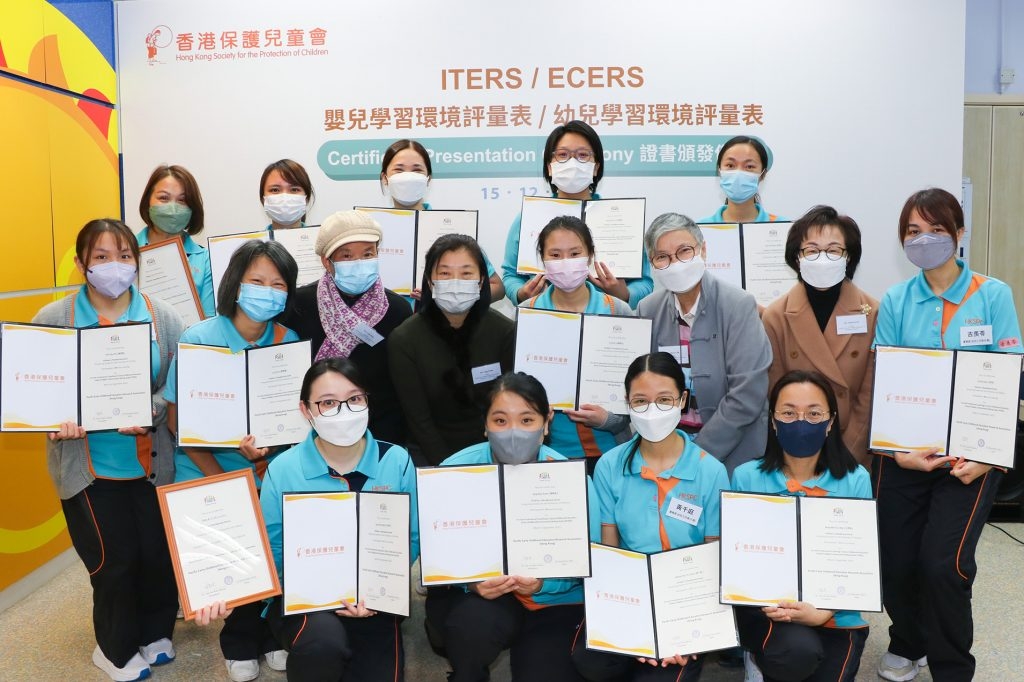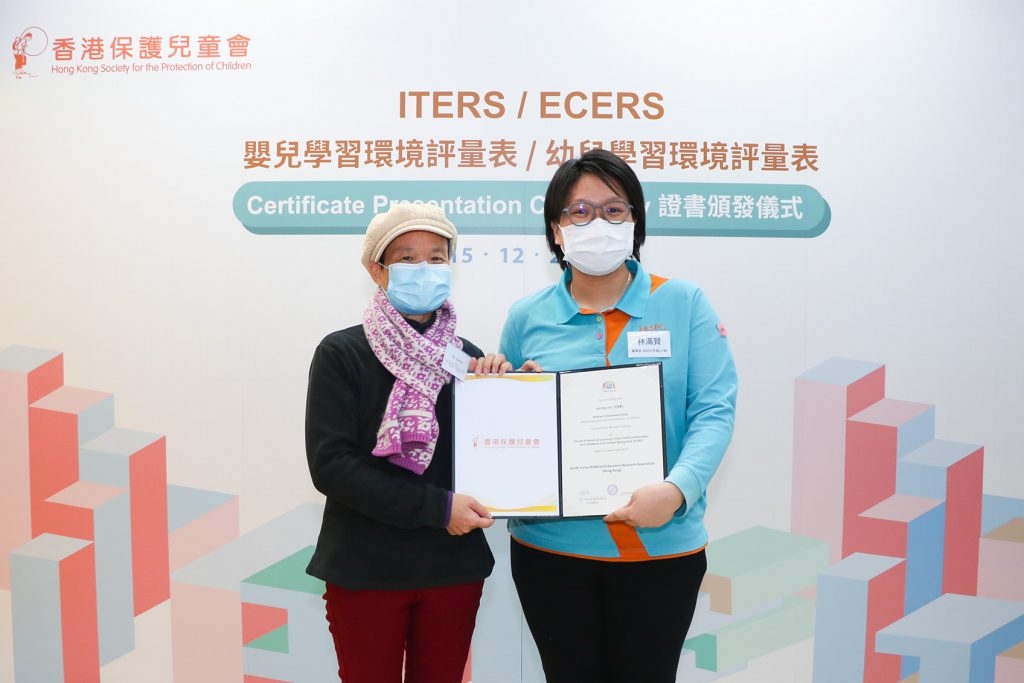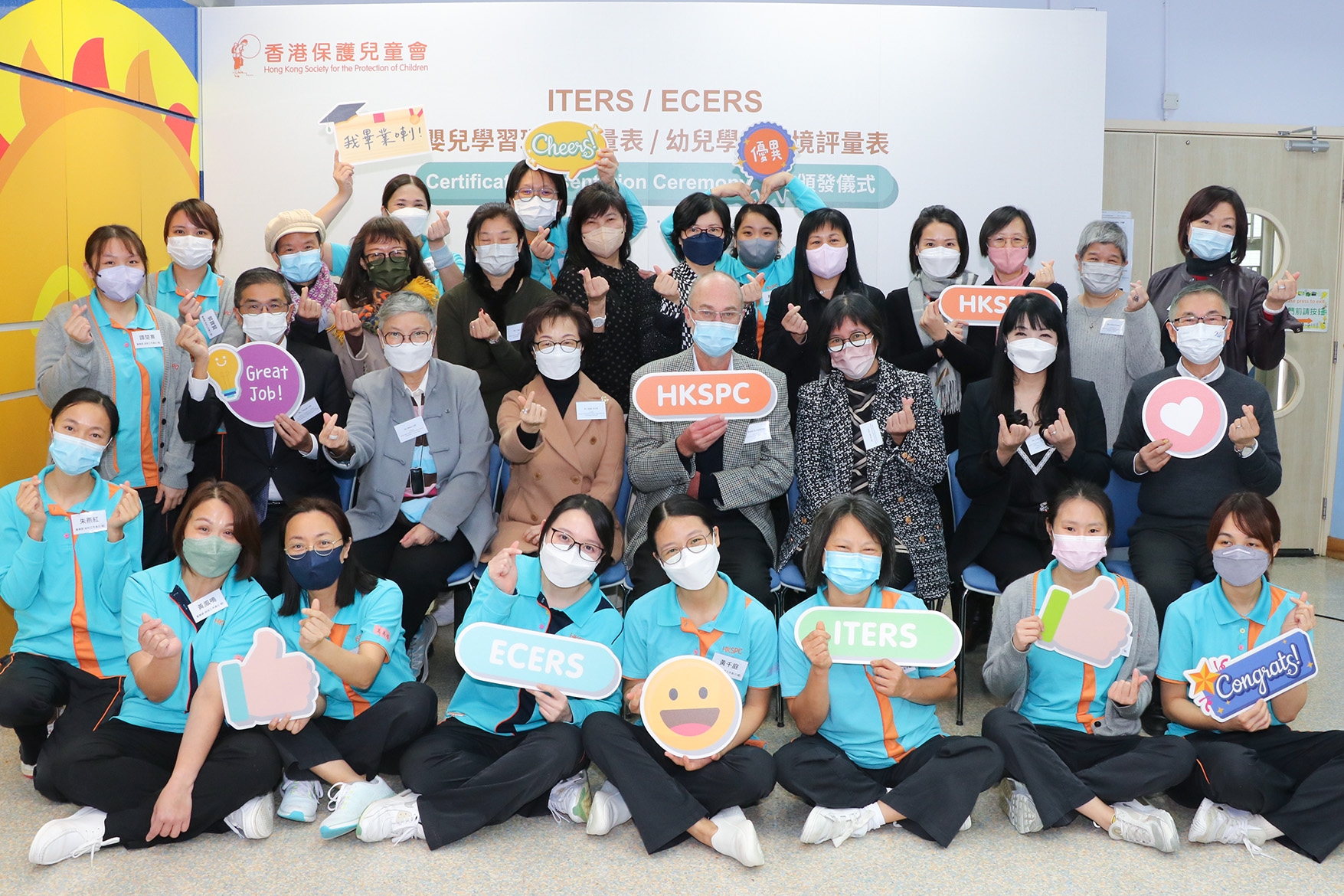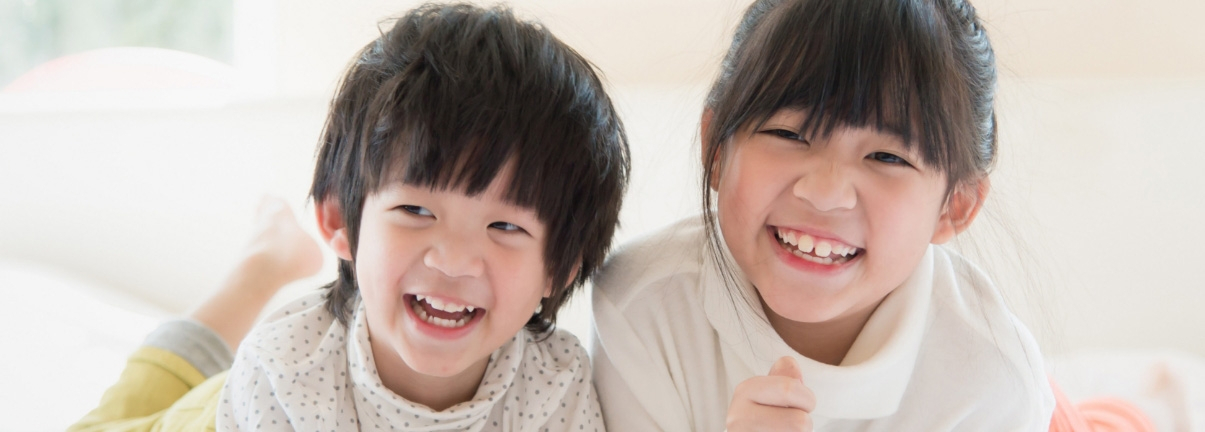(15 Dec 2022, Hong Kong) Determined to learn from the devastating CRH Incident last December and to rebuild its child care service to the front edge, the Hong Kong Society for the Protection of Children (HKSPC) launched in March a nine-month CRH Reform Project led by the Council of Non-profit Making Organisations for Pre-primary Education (CNOPE) with guidance and support from the Social Welfare Department (SWD). The conclusion of the CRH Reform Project on 20 December is celebrated today with a certificate presentation ceremony, recognising the exceptional efforts of the new team of frontline CRH Child Care Workers (CCW) who achieved a service quality certified as satisfactory overall according to the Infant/Toddler Environment Rating Scale (ITERS, for young children) and Early Childhood Environment Rating Scale (ECERS, for children aged 3 and above).
ITERS/ECERS is an instrument used internationally to measure the quality of childcare setting. By guiding frontline staff and showing how well their service meets children’s needs with quality improvement goals, ITERS/ECERS helps ensure that the service is child-centric and in the best interest of the child. It is not only a structural indicator to measure the features of the classrooms, but also a process quality indicator to scrutinise the quality of care, such as that of interactions between staff and children, interactions between children and the environment, with activities and daily schedule designed to facilitate children’s all-round development.
Dr Maria Lee, President of PECERA-HK, said, “Our Association’s professional team has coached and inspired the CCWs of CRH with the highly effective and trusted ITERS to evaluate the condition of the four classrooms, set concrete goals, explore the feasibility of different actions before putting them into practice and reviewing the results. As the CRH Reform Project comes to a conclusion, PECERA-HK has observed after the training an improvement of at least 2 grades on average at CRH on the 39 rating sub-scales of ITERS. The CRH CCWs who completed our training programme are highly focused and proactive in seeking improvements. After witnessing the significant changes in classroom practices, play and learning areas, hygiene conditions and safety, as well as the children’s self-care and verbal skills, the CCWs felt a great sense of accomplishment, shifting from a rather passive attitude in the beginning to a lot more positivity nowadays. With staff full of confidence in its reform, CRH is now filled with positive vibes.”
Carers’ learning was supported by on-site professional coaching provided by PECERA–HK with pre/post-tests to gauge changes and spotlight areas for improvement. Such personalised care and attention for the carers themselves proved to be beneficial in building the confidence and competence of our frontline CCW team, contributing to the new and sustainable CRH culture.
CNOPE seconded 29 child care workers to CRH for about six months and two project management staff for nine months from their member organisations to help introduce fundamental changes to the operating model of CRH, while the Yew Chung College of Early Childhood Education (YCCECE), Department of Childcare, Elderly and Community Services of the Hong Kong Institute of Vocational Education (Sha Tin), (CECS of IVE), and the Pacific Early Childhood Education Research Association – Hong Kong (PECERA-HK) provided training to the leaders and front-line workers of the Home. The Division of Clinical Psychology of the Hong Kong Psychological Society was also engaged prior to the CNOPE project to help counsel staff in understanding and coping with stresses from the CRH incident.
“It has been an exceptional reform journey at CRH symbolic of and supported by the drive to build a new culture and best practice in this highly complex and challenging service unit. With the help of the industry through CNOPE and their professional partners, the new CRH team has made very substantive improvements while under intense scrutiny to ensure we provide the best possible environment for these children in need. We have introduced a new educare model that aims to incorporate age-appropriate stimulation and education for the young children under our care, many of whom have developmental disabilities or special educational needs. Underpinning this is a substantially improved staff: child ratio, from typically 1:7 to 1:5, as well as revision to our staff rostering so that the children are in familiar groups with familiar staff. With a new management team in place, and an increased emphasis on child safeguarding and staff training, we will continue to improve,” said Robin Hammond, Chairman of the Executive Committee of HKSPC.
“Work is also ongoing to improve the digital platform for the Home to reduce administrative work that used to occupy CCWs and the multi-disciplinary team at CRH. The enhanced platform should help to reduce human error and associated risks. We are immensely grateful for the help offered to us through this difficult time, showcasing the collaborative power of the sector and helping to address issues for the care sector in general. The road ahead is long and sustaining the positive changes will prove every bit as challenging as introducing them. Trust is difficult to earn, and easily lost. We will continue to do everything we can to regain that of the families we serve and all our stakeholders,” continued Robin.
Subrina Chow, Director, HKSPC, remarked, “Working and learning to address the multi-faceted challenges together with the CNOPE team over the last nine months have been most inspiring. We’ve seen ups and downs, cried and laughed but we’ve never given up striving to do better to safeguard our children. The frontline team now knows they are not alone, and the back office team knows they are as responsible to ensure service quality as pledged at the delivery point. I am confident our new team will continue to work and improve as one. We shall also seek to contribute to the sustainable training and professional development by sharing HKSPC’s experience in a structured, step-by-step manner.”
Among the CCWs proudly received their certificates today were members of the seconded CNOPE team and CCWs re-deployed from other service units of HKSPC, who chose, in the end, to stay at CRH to join its staff. Ms. Wendy Chau, Assistant Director (Family & Child Welfare) of Social Welfare Department has also attended the ceremony.
The Reform Project was part of the Change to Improve initiative introduced by the HKSPC in response to the recommendations of the First Interim Report of the Independent Review Committee. Apart from bringing in new leadership to strengthen management and reshape culture, HKSPC has also strengthened its governance structure, membership and processes, with as much transparency as possible, and continues its review of its broader operations.
 |
|
Among the CCWs proudly receiving their certificates today were members of the seconded CNOPE team and CCWs re-deployed from other service units of HKSPC, who chose, in the end, to stay at CRH to join its staff. |
 |
|
Lam Mun Yin was re-deployed in February to CRH to help at a time of emergency. With the growth and development she received hence, she has decided to join CRH as permanent staff. |
 |
|
Partners in the CRH Reform Project, including Council of Non-profit Making Organisations for Pre-primary Education, Yew Chung College of Early Childhood Education, Department of Childcare, Elderly and Community Services of the Hong Kong Institute of Vocational Education (Sha Tin), Pacific Early Childhood Education Research Association – Hong Kong, and the Social Welfare Department, celebrated together on achieving positive change for CRH. |
